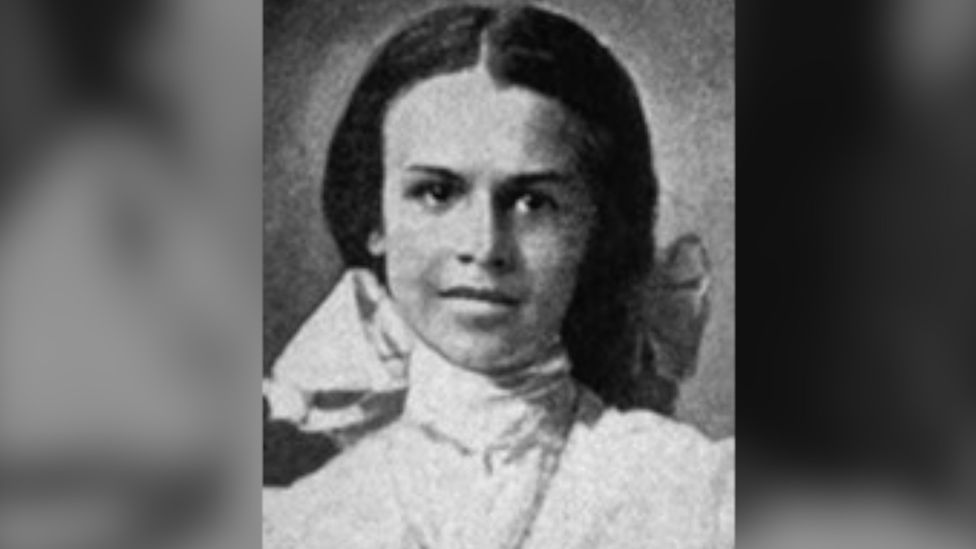ARTICLE AD BOX
 Image source, Babbel
Image source, Babbel
Marie Bolden was 13 years old when she won America's first-ever national spelling bee
By Nadine Yousif
BBC News, Toronto
In 1908, Marie C Bolden, an African American teenager, became the first-ever spelling bee champion in the US, overcoming tricky words like 'acquiesce', 'descendant' and 'millinery' on her way to the top. But her achievement was quickly eclipsed by racial prejudice, and her story rarely told.
More than a century later, a search for her long-lost medal has been launched in an effort to shed light on Ms Bolden's triumph and to celebrate her win.
Born in Ohio, Ms Bolden, 13, was one of 15 eighth graders selected to represent the city of Cleveland in what was the first national spelling competition in the US.
According to historical records and recounts, she had ranked last in qualifying for her team, but the school's superintendent, Warren Hicks, was determined to have her participate.
This despite opposition from other competitors, mainly in the city of New Orleans, who had threatened to drop out of the competition due to having to face a black opponent on stage.
Ms Bolden went on to become the individual champion that year, beating students from three other cities after flawlessly spelling 100 words in a written test and four words on stage. She was awarded a gold medal for her achievement.
"I just kind of gritted my teeth and made up my mind that I wouldn't miss a word," she told a newspaper reporter at the time. Her accomplishment was applauded by 6,000 adults who witnessed her historic win.
The spelling bee competition that Ms Bolden won was part of an annual convention for the National Education Association, held that year in Cleveland's Hippodrome Theatre.
It predates the first-ever Scripps National Spelling Bee by 17 years - an annual competition that has since featured students from across the US and its territories, and even from other countries like Canada, India and Japan. The competition had its first African American winner, 14-year-old Zaila Avant-Garde, in 2021.
It is currently in its 95th year, with this year's champion scheduled to be crowned in a televised event on Thursday.
But aside from a few newspaper articles and a mention in a book titled 'Black Americans in Cleveland', Ms Bolden's ground-breaking win 115 years ago largely went unrecognised for the majority of her life.
That is until her death in 1981, when her family discovered a newspaper article about her feat, her grandson Mark Brown told the BBC.
"We said, 'Oh, goodness, grandma was a trailblazer,'" Mr Brown, a retired 68-year-old schoolteacher who lives in Canada, said.
"I'm blown away that it is coming to light now."
In articles about her win, Ms Bolden said that she did not enter the contest "for personal glory, but to try to help bring honour to my teacher and my school".
But her win was met with fierce racially-charged opposition. Some politicians and educators refused to recognise Ms Bolden as the spelling bee champion, and criticised the competition for allowing her racially integrated team to compete against all-white teams.
Her win was especially opposed in Louisiana, a southern state that was once one of the centres of the US slave trade, where newspapers had suggested that New Orleans teams lost the competition due to being unsettled by having to compete with a black student.
Can these Spelling Bee parents spell as well as their kids?
A spelling bee planned in Ms Bolden's honour by the New Orleans black YMCA was also cancelled by the mayor at the time, citing a risk of a "race riot".
Mr Brown, who described his grandmother as "quiet", said she never spoke of her win.
"She didn't bring a lot of attention to herself," he said. " … and I think for a lot of people who, at that time, were considered 'coloured', you didn't want to bring a lot of attention to yourself because a lot of times it was negative."
Ms Bolden later moved to Canada with her husband. Their motivation to move, Mr Brown said, was a belief that African Americans were treated better in Canada than they were in the US.
Ms Bolden's achievement is now gaining more attention thanks in part to language-learning software Babbel, which dug into her history in collaboration with her family. They have also launched a search for her gold medal, which has yet to be found.
"When our research led us to her story, we couldn't believe how little-known and under-celebrated it was," said Malcolm Massey, a language expert at Babbel.
Mr Massey said he hopes the search for the missing medal will bring awareness to Ms Bolden's story across the US, and will serve as a reminder that spelling bee competitions are "an inclusive leveller".
Mr Brown said he is extremely proud of his grandmother, and said her story is a reminder of the sacrifices and struggles endured by generations past.

 1 year ago
53
1 year ago
53








 English (US)
English (US)